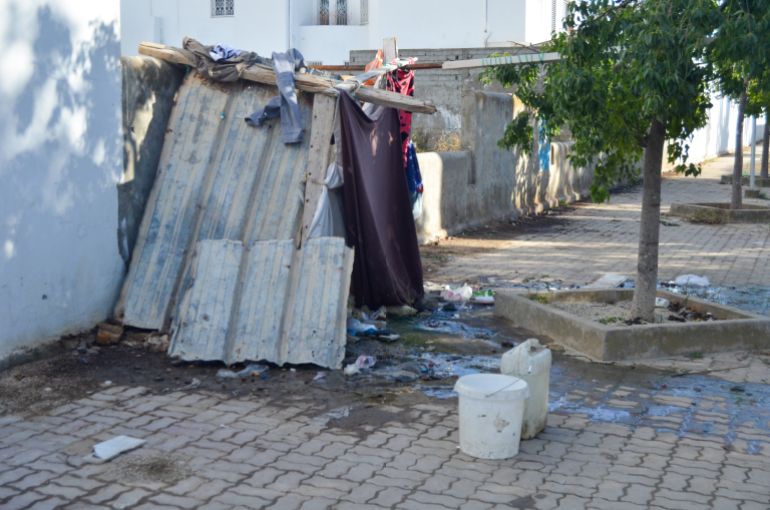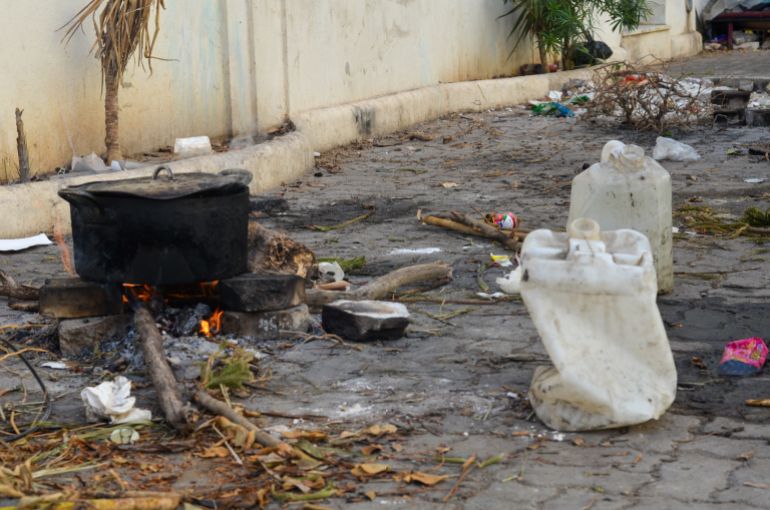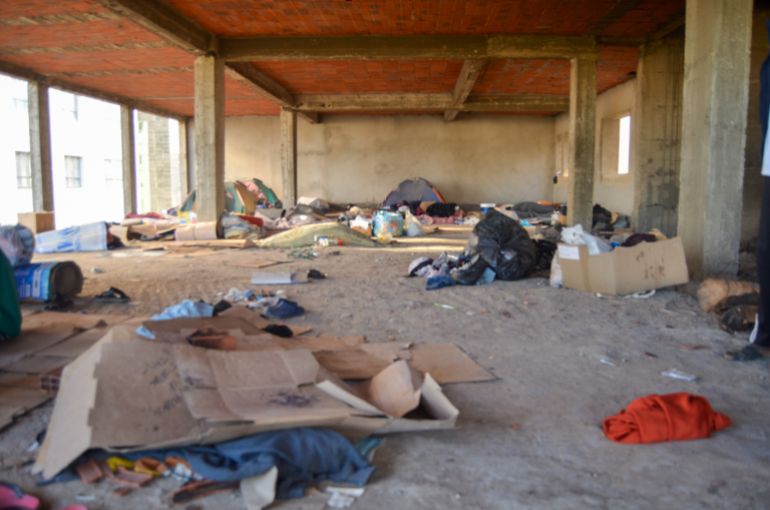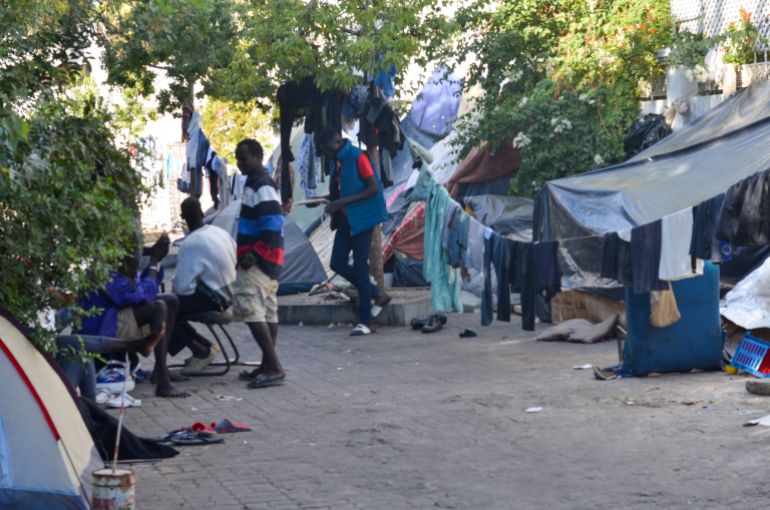Tunis, Tunisia – “It’s very cold. I don’t have no tent,” the 22-year-old woman, who says her name is Jessica, tells Al Jazeera, her friend’s baby boy hanging from her neck.
“I just use the carton,” she says of the cardboard she sleeps upon. It is her only protection against the cold and the night air. “I hurt when I wake up.”
Jessica fled a life of destitution in Freetown, Sierra Leone four years ago, eventually travelling to Oman.
She arrived in Tunisia two weeks ago but doesn’t know what she will do now.
It is November and rain is currently sweeping Tunis, with temperatures forecast to remain low. Jessica sleeps out in the open with around 150 other refugees, asylum seekers and migrants outside the offices of the International Organization for Migration (IOM), in the well-heeled business district of Lac 1, in Tunis.
A few hundred metres away, hundreds more sleep in the local park or in the half-completed tower block that overlooks it.
“I’m scared of the police,” Jessica says. “If you go outside and they catch you, they will take you to the police station and you will disappear.”

People in both camps say they feel they have been forgotten – by society, the government and the international community. The bulk of those gathered in Tunis will be here for the long haul.
Some are waiting for a “refugee card” – a temporary UNHCR registration document valid for one year showing a person’s legal status as a refugee – others are waiting for the calm seas that will make their passage between Tunisia and Europe less treacherous.
“I’ve been living here for two months,” says 20-year-old Matteaus Osman.” The cold makes it difficult. The ground is so cold. I don’t have blankets.”
Matteaus wanders across the narrow alleyway, waste water pooling in its centre and points to the cardboard he sleeps on outside a cluster of tents mostly occupied by families with children.
“When I wake up I am in pain,” he says.
‘No food, no opportunity’
In September, Tunisian police and National Guard units carried out a major crackdown on refugees staying in the coastal region of Sfax. The government said the move was an operation to combat people smuggling.
But activist groups and aid agencies say they were blocked by police from delivering relief to the refugees in Tunis or to those gathered in the port city of Sfax, for two weeks.
Many are still nervous about being caught by police delivering aid to those sleeping on the street.

The shortfall shows. Around the outskirts of the park, lying on the rain-starved dirt, a long line of cardboard skirts the perimeter fence. Blankets are rare.
In one section indistinguishable from any other, 43-year-old Suleiman, an orthodox Christian from Egypt, shows where he sleeps. “This is how we live, we are sleeping in the cold season and it will get colder,” he says, the grey hair showing in his moustache. “We have no food and no opportunity to get a job. It is very hard,” he says.
In the half-completed tower block nearby, each floor hosts countless refugees and asylum seekers, all doing what they can to protect themselves from the cold night wind that blows through the part-built walls.
On the ground floor, a shanty town market holds sway, with the air filled with steam from boiling pasta and sauces, scraped together from any income that can be made from day labour and the small stipend paid to those who have spent months navigating UN bureaucracy.

Mohamed Marengan from Sudan acts as tour guide, guiding Al Jazeera through the skeletal tower block. He points out those curled up on flattened cardboard boxes or lying under the few blankets. All the while, he repeats warnings about the hole in the floor that runs through the building, and describes how two people have previously fallen through it in the dark and broken their legs.
“The owner of this house called last week,” he says of the building. “He says he wants everyone out. He has a right to do this. We told the United Nations about this. We say we need a place to sleep. They did nothing.”
The situation is serious, he explains. “If we leave here. We go a few kilometres. You get arrested.”
Months-long wait for refugee cards
UNHCR, the UN’s refugee agency, says it is doing what it can to ease the plight of refugees stuck here but the shelters it has provided are already at capacity. Moreover, the rise in the number of refugees arriving here since fighting broke out in Sudan in April has overwhelmed the two Tunisia offices – one here and one in Zarzis.
Last year, the UN registered 203 Sudanese arrivals in total. As of October this year, the number for 2023 was 2,523, with more arriving by the day.
The agency has secured additional resources, a spokesperson said. Despite this, refugees arriving in Tunis can still expect a long wait before they can be issued with a refugee card. At the moment, the wait is months. It may get down to two months by 2024, the spokesperson said.
In the meantime, arrivals will have to continue to wait as temperatures fall.

But, even when you have obtained a card, it offers only a film of legal protection. In theory, the card allows refugees to move around and access basic services, but it doesn’t always help much.
Abdullah Babaker from Sudan claims that he was picked up by police at Tunis train station along with five others when they arrived from Sfax, despite showing their refugee cards which were issued by the UNHCR office in Zarzis.
The police officer “just took the card and put it in his pocket”, Abdullah says, describing how he and five others were driven to the police station before being sentenced to one-month imprisonment for entering the country illegally, the statutory sentence for doing so.
Three months after entering Tunisia – two waiting for the card in Zarzis and one month in prison – Abdullah finally reached Lac 1, where he has been for four days. It’s not all he was hoping for.
“In prison, my life was better,” he says. “I can eat for free. I can drink for free. I can shower free. but here I cannot. Life in prison is as good as it gets here.”

Abuse by the authorities
Abdullah’s experience is far from unique. The NGO Refugees International published a report last month detailing abuse of refugees by the Tunisian security services, including violent assaults and forcible expulsion to desert and border areas.
“According to several international agency reports we obtained, people holding (UNHCR) documentation have also not only been subject to unlawful arrest and imprisonment but they have also been caught up in the illegal, violent expulsions to border and desert areas that have been ongoing in large numbers since at least early summer and which have entailed widespread injury as well as dozens of deaths,” Jeremy Konyndyk, president of Refugees International, told Al Jazeera by email.
“There appears to be very little oversight or accountability when it comes to abusive practices – despite the repeated protection concerns voiced by Tunisian organisations, international agencies and foreign governments.”
Arrivals in Europe from Tunisia have almost doubled since last year, heightening tensions in southern European countries, but giving refugees here hope that they might make it across the Mediterranean – if they can survive the dangerous crossing.
In the meantime, hanging from Jessica’s arm in the alleyway outside the IOM in Tunis, a baby cries.
Source : AlJazeera


